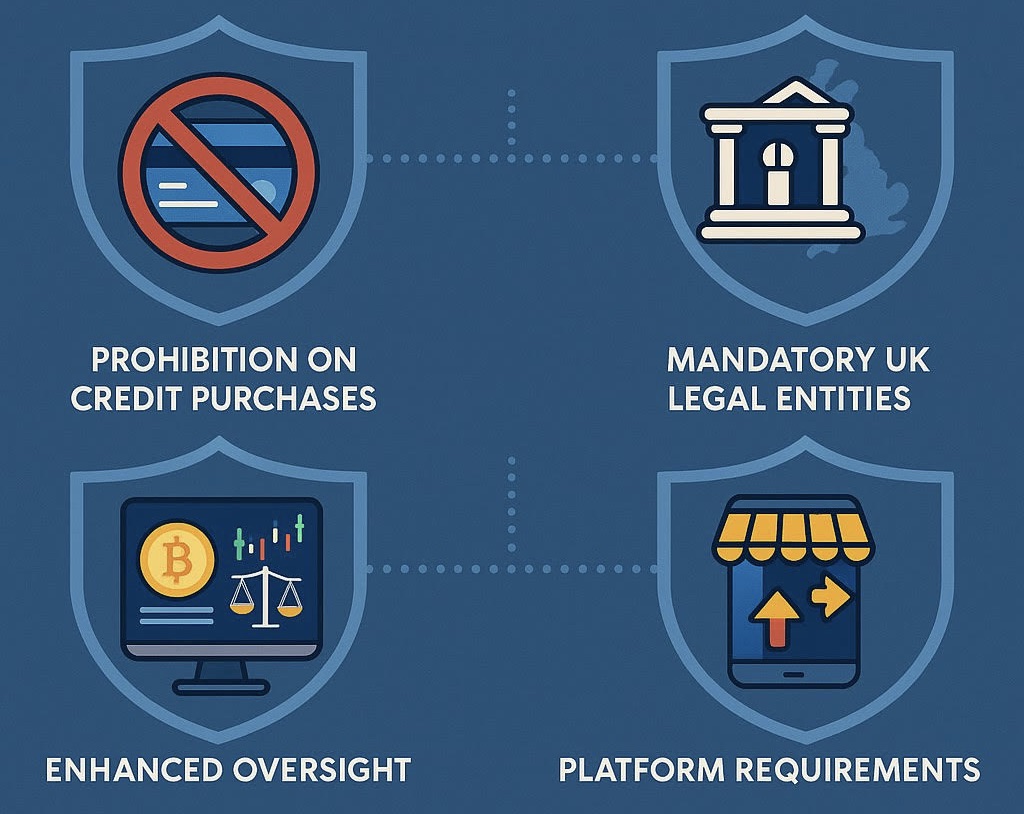Introduction
The United Kingdom is poised to draw a hard line between financial caution and crypto enthusiasm. In an assertive move to bolster retail investor protections, the Financial Conduct Authority (FCA) has proposed a crypto credit ban i.e. ban on using credit—including credit cards and other forms of borrowed funds—for purchasing cryptocurrencies. The draft measure signals a decisive shift in the UK’s regulatory posture, aligning with broader global trends aimed at curbing speculative risk in digital asset markets.
Crypto Credit Ban-Why This Matters?

As cryptocurrencies gain mainstream traction, regulators worldwide are grappling with how to mitigate associated risks. The FCA’s latest proposal, unveiled in April 2025, squarely targets the use of leverage by retail investors—a practice the authority deems disproportionately risky. With crypto markets notorious for volatility and price manipulation, the FCA’s concern is that everyday investors are exposing themselves to financial ruin without adequate safeguards.
This move isn’t just domestic policy—it’s a regulatory signal with global resonance.
Key Takeaways from the FCA Proposal

1. Ban on Borrowing for Crypto Purchases
Retail investors would no longer be permitted to use credit facilities, including credit cards, personal loans, or buy-now-pay-later schemes, to invest in cryptocurrencies. The goal is to eliminate leveraged retail trading, which magnifies both gains and losses in an inherently volatile market.
2. Platform Conduct Standards
Crypto trading platforms operating in or serving the UK must now implement strict operational protocols:
- Segregation of client and proprietary trading.
- Real-time transparency in order execution.
- Mandatory disclosures on token listing standards.
3. UK Legal Entity Requirement
Any crypto business wishing to engage UK-based customers must establish a registered UK legal entity. This aims to localize accountability and bring digital asset services under domestic regulatory reach.
4. Differentiated Standards for Retail vs. Professional Clients
Retail users will be treated with a higher standard of care. This includes stringent risk disclosures, suitability checks, and simplified communication around investment risks.
How Crypto Businesses Can Prepare: A Legal Compliance Snapshot

For startups and crypto service providers, this regulation is not just financial—it’s legal. Here’s what firms must consider:
- Company Structure: Set up a UK-registered legal entity compliant with Companies Act 2006 and FCA licensing norms.
- Consumer Protections: Design onboarding workflows that meet FCA requirements for KYC, risk categorization, and disclaimers.
- Internal Controls: Document trading desk separation, conflict-of-interest policies, and client fund segregation mechanisms.
LexNova can assist with setting up compliance infrastructure and cross-border legal strategy for crypto ventures.
Impact on the Crypto Ecosystem

For Investors:
This regulation is likely to discourage impulsive or high-risk behavior in retail trading. While some may see it as restrictive, many analysts argue that it could encourage healthier, longer-term investment strategies.
For Platforms:
Firms such as Binance, Coinbase, and Kraken that serve UK users will need to reassess their compliance frameworks. Non-compliance could lead to restrictions, fines, or even market exclusion.
For the Market:
The proposed rules could cool short-term speculative trading but enhance the market’s long-term credibility. Legal clarity may also attract institutional investors who previously avoided the sector due to regulatory uncertainty.
Our Take: Why This Sets a Legal Precedent

LexNova’s legal experts believe this proposal could influence similar frameworks globally. It strengthens the duty of care toward retail investors and reinforces the FCA’s evolving view that crypto must fall within traditional financial legal boundaries.
It also affirms a trend: the crypto sector is no longer legally “grey”—it is rapidly entering the mainstream of regulated financial services law.
Global Ripple Effects

The UK’s proposal is likely to influence regulators in other jurisdictions. It follows similar moves by the European Union under MiCA (Markets in Crypto Assets) regulation and increased scrutiny by U.S. authorities, including the SEC and CFTC.
India is also stepping up its oversight—taxing crypto gains and mandating registration for exchanges.
The UAE is rapidly developing digital asset laws under ADGM and VARA regimes.
Canada and the U.S. are imposing KYC, custodial, and leverage-related limits.
Startups operating internationally must now anticipate jurisdiction-specific laws—and proactively build multi-jurisdictional compliance.
Conclusion
The UK’s proposed crypto credit ban i.e. ban on borrowing to buy cryptocurrencies is not merely a financial rule—it is a legal watershed moment in global crypto regulation. Whether you’re a retail investor, a fintech startup, or a compliance professional, understanding the implications of this shift is now essential.
LexNova will continue to monitor developments as the FCA moves from consultation to implementation. For tailored guidance on crypto compliance or global regulatory frameworks, get in touch with our legal experts.
References
Read more on Reuters
With changing regulations affecting crypto businesses, choosing the right jurisdiction for your startup has never been more critical. Discover the best locations for incorporating your venture in our comprehensive guide here.
If you want to talk to us, just fill in the form by clicking here.


One Response